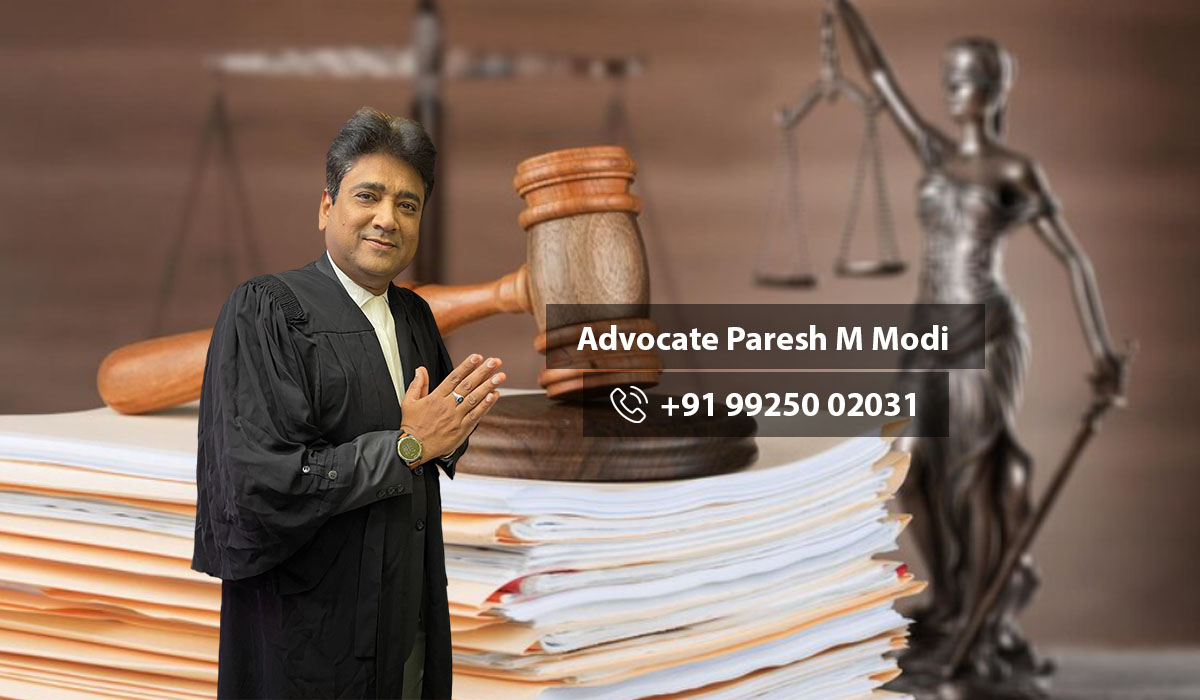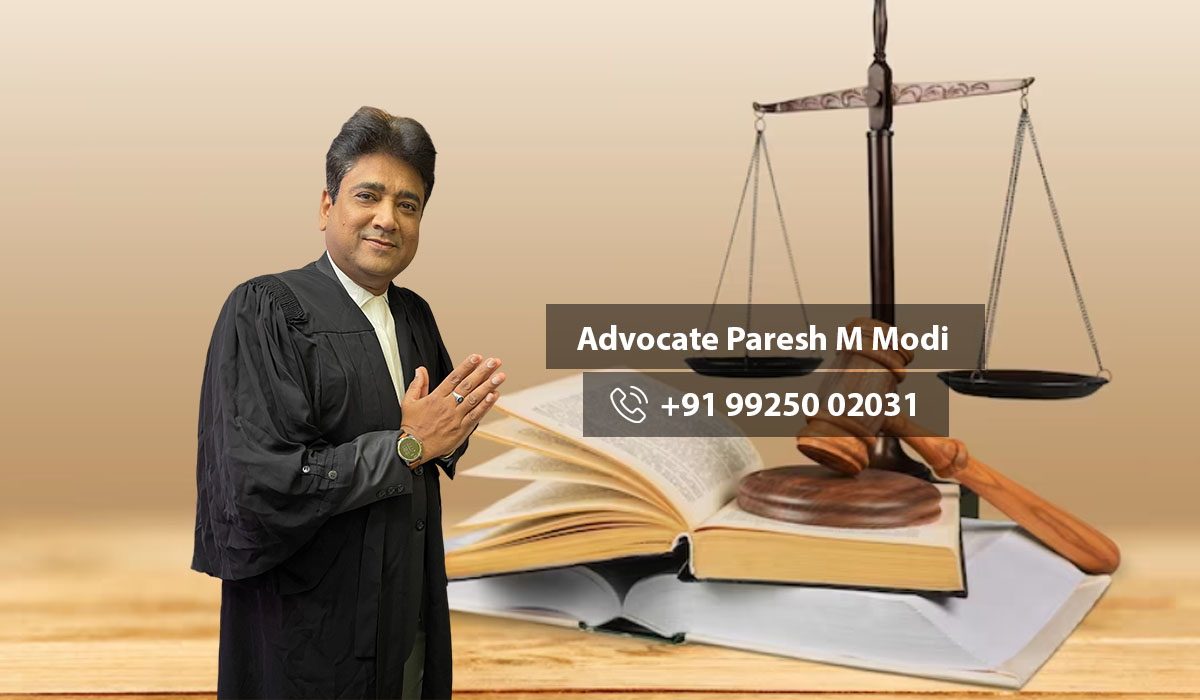Attorney For Gujarat Land Grabbing Cases in Ahmedabad | 9925002031 | Lawyer for Land Grabbing Case in Gujarat | Advocate Paresh M Modi
Advocate Paresh M Modi, based in Ahmedabad, Gujarat, is a distinguished legal expert specializing in Land Grabbing Act cases. As a prominent advocate for Land Grabbing Act cases in Ahmedabad, Gujarat, he offers comprehensive legal services to clients embroiled in disputes over illegal land acquisition. With an in-depth understanding of the complexities associated with the Gujarat Land Grabbing (Prohibition) Act, Advocate Paresh M Modi ensures that his clients receive expert guidance and representation throughout the legal process. His extensive experience and profound knowledge of the Act enable him to navigate the intricacies of these cases efficiently, safeguarding his clients’ interests and property rights.
Vakil Paresh M Modi’s reputation as a leading Advocate for Land Grabbing Act cases in Ahmedabad, Gujarat, is built on his relentless commitment to justice and his clients’ welfare. He meticulously examines each case, providing personalized legal strategies tailored to the specific circumstances and legal challenges faced by his clients. His adept handling of legal documentation, evidence presentation, and courtroom arguments underscores his proficiency in managing land grabbing disputes.
Clients seeking a Vakil for Gujarat Land Grabbing Act cases in Ahmedabad can rely on Advocate Paresh M Modi for his exceptional legal acumen and dedication. His proactive approach in addressing legal issues, combined with his strategic litigation skills, ensures favorable outcomes for his clients. Whether it involves defending against wrongful claims or prosecuting illegal land grabbers, Advocate Paresh M Modi’s expertise is instrumental in achieving justice.
In a legal landscape fraught with complexities, Advocate Paresh M Modi stands out as a trusted advisor and formidable advocate for Land Grabbing Act cases in Ahmedabad, Gujarat. His unwavering commitment to upholding the law and protecting his clients’ rights makes him a highly sought-after legal professional in this specialized field.
GUJARAT LAND GRABBING (PROHIBITION) ACT, 2020.
No. GHM/2020/141/M/JMN/102020/713/L1
- Short title and commencement.-
(1) These rules may be called the Gujarat Land Grabbing (Prohibition) Rules, 2020.
(2) They shall come into force on the date of their publication in the Official Gazette.
- Definition.-
(1) In these rules, unless the context otherwise requires,-
(a) ‘Act’ means the Gujarat Land Grabbing (Prohibition) Act, 2020;
(b) ‘Court’ means the Special Court constituted under section 7 of the Act;
(c) ‘Form’ means a Form appended to these rules;
(d) ‘Section’ means a section of the Act;
(e) ‘Village’ means revenue village declared under section 7A of the Gujarat Land Revenue Code, 1879.
(2) Words and expressions used but not defined in these rules and defined in the Act shall have the meanings respectively assigned to them in the Act.
- Procedure for making application.-
(1) An application shall be presented in person or by post to the District Collector having jurisdiction over the area where the disputed land is situated.
(2) Every application shall be made in the prescribed Form and shall be duly signed and verified by the applicant.
(3) Every application shall be accompanied by true copies of all the documents in triplicate, duly signed in each page on which the applicant proposes to rely. IV-B Ex.-463 463-1 463-2 GUJARAT GOVERNMENT GAZETTE EX., 16-12-2020 [PART IV-B
(4) Acknowledgment receipt of the application shall be given and an entry shall be made in the register maintained for the purpose.
- Application Fees. – Every application under this Act, shall be accompanied by application fee worth Rs. 2000/- only, to be paid by electronic means.
- Inquiry by the Committee. –
(1) On receipt of the application, the Collector shall entrust the inquiry to the concerned Prant Officer and / or any other officer including a Police Officer as may be deemed fit.
(2) In case of Government Land or in case where the person who has allegedly grabbed the land is headstrong person, the collector or the State Government may take suo-moto cognizance and action shall thereafter be taken in accordance with sub-rule (3) to (10).
(3) On receipt of the application, the Prant Officer or the officer to whom the application has been referred to shall ask concerned authorities to furnish report containing all the details and permission issued by them along with relevant documents within 5 days.
(4) An inquiry shall be conducted for the prima facie locus standi of the applicant based on reports and records received from different authorities; and a conclusion to be derived whether a land title can be established.
(5) An inquiry shall be conducted by the Prant Officer or the officer to whom application has been referred to, whether Land in question has been occupied or attempted to occupy, in unauthorized manner, with the use of force, threat, intimidation and deceit or by cheating, fraud and/or forgery;
(6) The Prant Officer or the officer authorized by Collector shall submit the final report to the Collector within 21 days from the date of the receipt of the application. The report shall state whether prima facie case under the Act is established or not; the committee may also ask for further inquiry if it considers necessary.
(7) In case of unauthorized, continued occupancy of the land which was allotted or leased to any person by the Government with conditions attached, is cancelled by the competent authority or on the expiry of lease and renewal of application for the same is not under consideration then under such circumstances the committee may consider such act as land grabbing.
(8) The committee shall consider the inquiry report and decide further course of action including filing an FIR within 21 days.
(9) As soon as the committee directs police to file FIR, it should be filed within 7 working days.
(10) The concerned investigation officer shall file final report before the special court within 30 days from the date of First Information Report.
- Powers and Functions of the Committee.-
(1) The Committee shall meet at least once in fifteen days, at such time and place as the Chairman may decide;
(2) All the applications/complaints received, in prescribed Form, by the District Collector shall be placed before the Committee through the Member Secretary;
(3) The Committee shall scrutinize the inquiry report and decide further course of action and if deemed fit refer the case to the Special Court to initiate court proceedings under section 9 and decision of the Committee shall be conveyed to the applicant. PART IV-B]
GUJARAT GOVERNMENT GAZETTE EX., 16-12-2020 463-3
- Power of Special Court to refer Cases. – The Special Court, under section 9 (1) of the Act, may refer to the committee any matter of which cognizance has been taken by the court either suo-moto or on an application made by any person to the court and ask for the scrutiny report from the committee as per Rule 5.
FORM [See rule 3(1)] Form of Application
To,
The District Collector,
Ahmedabad, Gujarat.
- Full name of the Applicant………………………………………………….. .
- Father’s/Husband’s Name………………………………….. .
- Address: – (a) Plot No/ Block No/ House No……………………………………… (b) Area……………………………………… (c) Village……………………………………… (d) Taluka……………………………………… (e) District………………………………………
- Name(s) and address of the respondent(s):- (a) Name ……………………………………… (b) Father’s/ Husband’s Name……………………………………… (c) Plot No/ Block No/ House No……………………………………… (d) Area……………………………………… (e) Village……………………………………… (f) Taluka……………………………………… (g) District……………………………………… (*In case of more than one respondent, name and address of each respondent should be mentioned separately.)
- Detailed particulars of the land alleged to have been grabbed:- (a) Survey No ……………………………………… (b) City Survey No……………………………………… (c) Ward No……………………………………… (d) Block No……………………………………… (e) TP/ FP No……………………………………… (f) Village…………………………………….. (g) Taluka…………………………………….. (h) District………………………………………
- Jantri Value of the land (in Rs.)……………………………………..
- Whether there is any house or structure on the land …………………………. 463-4 GUJARAT GOVERNMENT GAZETTE EX., 16-12-2020 [PART IV-B
- A concise statement of all relevant facts as to the claim (if necessary, extra sheet may be added)………………………………………………………………………..
- Summary of the evidence proposed to be adduced……………………..
- True copies of the documents relied on…………………………………
- Other relevant particulars to identify the property……………………….
- Any other particulars which the applicant intends to furnish…………
Land Grabbing Case Lawyer | Paresh M Modi | 9925002031 | Top Criminal Advocate in Ahmedabad Gujarat
Advocate Paresh M Modi is the Best Criminal Advocate in Ahmedabad having main office at Ahmedabad Gujarat, he know very well to how to handle the Gujarat Land grabbing act Cases, PMLA cases, POCSO Act Cases, PASA act Cases, IPC 406 420 467 Cases and other criminal cases and do detail search in matters aspects including FIR, Charge Sheet, Punchanama Report, Witnesses, FSL officers, Place Time and Presence of the people, involvement of others, Discovery and Recovery of materials and many more things. He is the expert cross examiner of the witnesses, complainant and investigation police officers in different type of sections of Indian penal code and other law and its Acts.
Advocate Paresh M Modi is the top Criminal lawyer in Ahmedabad among the Top Criminal Lawyers in Ahmedabad Gujarat, you may say that he is the experience top advocate in Ahmedabad among the top advocates in Ahmedabad Gujarat, Specially he is handling the Criminal bail matters in Ahmedabad Vadodara Surat Nadiad Kheda Anand Dholka Gandhinagar Mahesana Kalol and many more Session court as well as District Court for Anticipatory Bail Cases, Temporary Bail Cases, Regular Bail Cases, Successive Bail Cases. Advocate Paresh M Modi is the specialist lawyer for Gujarat Land grabbing Act Cases, Advocate Paresh M Modi is the seasoned Advocate of Gujarat High Court for Criminal Cases specially Bail matters. Call and Book the Appointment of him on Mo. 9925002031.
Final Words
The Gujarat Land Grabbing (Prohibition) Act, 2020, is a strict law to curb illegal land encroachments. If you are involved in a land grabbing case, whether as a victim or accused, expert legal guidance is crucial. Advocate Paresh M Modi is one of the best land grabbing lawyers in Gujarat, ready to protect your land rights and defend you in court.
For legal assistance in land grabbing cases, contact:
📞 Mobile: +91 9925002031 (WhatsApp only, 9 AM – 9 PM)
📞 Office Landline: +91-79-48001468 (10:30 AM – 6:30 PM)
✉️ Email: advocatepmmodi@gmail.com
🌐 Website: www.advocatepmmodi.in
📍 Office Address: C/112, Supath-2 Complex, Opp. Kohinoor Plaza Hotel, Near Old Wadaj Bus Stand, Ashram Road, Ahmedabad, Gujarat – 380013, India.
Land Grabbing Act Cases Advocate in Gujarat | Advocate Paresh M Modi | 9925002031 | Ahmedabad



